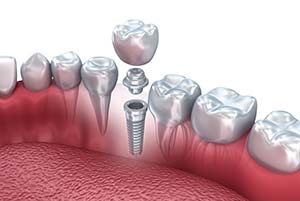
If you’re one of the 178+ million adults who are missing teeth, you may be considering dental implants as an option for replacing those teeth. However, it’s important to note that this dental procedure can be expensive. On average, dental implants cost $3,000 to $6,000 and includes the implant/post, the abutment, and the crown. This cost does not include any additional charges such as imaging, extractions, etc.
Therefore, when you make this investment, you’re investing in something that should last for the rest of your life- as long as you take proper care of them.
Again, proper care is important for extending the life of your dental implants. Below, we will offer you 7 aftercare tips to do just that. After all, Dr. Trichas wants you to be able to enjoy your new smile for years to come.

When you come in for dental implant installation, you will be provided with some specific aftercare instructions. In order to ensure that the implants don’t fail, you need to make sure you follow these instructions.
For the first few days, it’s advisable that you limit your diet to soft or liquid foods only. In addition, you need to avoid foods that are really hot and foods that are spicy. You will also be advised to avoid brushing the surgical site. Aftercare instructions also include the following:
If you carefully follow appropriate aftercare instructions, chances of implant failure decreases, and the life expectancy of your dental implants increases.
If you truly want to increase the life expectancy of your dental implants, you’ll quit smoking. Implant failure is rare- but it is much higher in smokers than it is in non-smokers for a variety of reasons:
One of the primary contributors to implant failure is gum disease. Therefore, the best way to protect against this is to brush twice daily. You may believe that since you’re missing your natural teeth, you don’t need to brush. However, this isn’t true. Your dental implants, along with your prosthetic teeth still accumulate bacteria and plaque. This causes bad breath and eventually leads to gum disease if not brushed away.
Make sure that you are still brushing your teeth and cleaning around your implants twice daily. Additionally, continue cleaning your tongue to keep your breath fresh and eliminate bacteria from your mouth.
Chances are, if you’re like most people, you haven’t really given much thought to the way you chew. However, it’s important to understand that it can have a significant impact on the life expectancy of your implants. For example, if you have a habit of biting hard or chewing on crunchy foods or using your teeth as tools, you are putting your implants at risk of failure.
Just like your natural teeth, dental implants can only handle so much wear and tear before they finally give up. Make sure that you are only using your teeth to eat food. Do not use them to open packages, crunch ice, or break hard candy.
Even if you have a mouthful of dental implants, its still advised that you visit the dentist at least once a year, if not every 6 months. You will be advised on the best schedule for you by our team of professionals. These visits allow the dentist to check for and remove any plaque and tartar build-up, as well as to check the health of your implants.
These check-ups allow us to find problems early on so they can be handled before they lead to implant failure. Plus, these visits keep your mouth healthy and clean.
If you drink alcohol, one way to extend the life expectancy of your implants is to enjoy it in moderation. You don’t want to overdo it. After all, alcohol can cause oral cancer and can also dry out your mouth, which leads to gum disease and ultimately, implant failure. So, you can still enjoy a drink every now and then, just not all the time.
When it comes to flossing, you have options. You can use traditional dental floss or you can use a water flosser. A water flosser may be the best option because they are easy and powerful enough to remove bacteria and plaque from areas that are difficult to reach. By using a water flosser, you can prevent gum disease, which increases the life expectancy of your implants.
If you are missing teeth, dental implants are one of the best options. They look, feel, and act like your natural teeth. Of course, they are also one of the most expensive options- so you might want to make sure that you’re taking proper care of them. follow these 7 tips to increase the life expectancy of your dental implants.
Dr. Konstantine Trichas in Basking Ridge, New Jersey specializes in dental implants. If you’re in the area and in need to dental treatment, schedule your consultation today. When you come in, be sure to ask any questions and bring up any concerns that you may have.